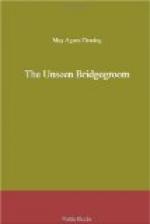“And so am I,” said the artist. “From what you say, it is evident she went willingly—of her own accord. In such a case, of course, I can do nothing.”
“She did not go willingly. I am certain she entered that carriage under the impression she was going with you.”
Mr. Ingelow’s sensitive face reddened. He rose and walked to the window.
“But since it was not I, who do you suppose it may have been?”
“Doctor Oleander.”
“No! He would not dare!”
“I don’t know him,” said Miriam; “but from what Mollie says of him, I should judge him to be capable of anything. He loves her, and he is madly jealous; and jealous men stop at nothing. Then, too, Mrs. Walraven would aid him. She hates Mollie as only one woman can hate another.”
“Doctor Oleander, then, must be the man who abducted her before, else how could he keep the assignation?”
“Yes,” said Miriam, “that is the worst of it. Poor Mollie! it will drive her mad. She detests the man with all her heart. If she is in his power, he will show her no mercy. Mr. Ingelow, can you aid her, or must I seek her alone and unaided?”
Mr. Ingelow was standing with his back to her, looking out at the last yellow line of the sunset streaking the twilight sky. He turned partly around, very, very pale, as the woman, could see, and answered, guardedly:
“You had better do nothing, I think. You had better leave the matter altogether to me. Our game is shy, and easily scared. Leave me to deal with him. I think, in a battle of wits, I am a match even for Guy Oleander; and if Mollie is not home before the moon wanes, it will be no fault of mine.”
“I will trust you,” Miriam said, rising and walking to the door. “You will lose no time. The poor child is, no doubt, in utter misery.”
“I will lose no time. You must give me a week. This day week come back, if Mollie is not home, and I will meet you here.”
Miriam bowed her head and opened the door.
“Mollie will thank you—I can not. Farewell!”
“Until this day week,” Hugh Ingelow said, with a courteous smile and bow.
And then Miriam Dane was gone, flitting through bustling Broadway like a tall, haggard ghost.
Hugh Ingelow turned back to the window, his brows knit, his lips compressed, his eyes glowing with a deep, intense fire—thinking. So he stood while the low, yellow gleams died out of the western sky, and the crystal stars swung in the azure arch—thinking, thinking!
CHAPTER XVIII.
“SHE ONLY SAID, ‘MY LIFE IS DREARY.’”
That same brilliant sunburst that transfigured the artist’s studio in Broadway blazed into the boudoir of Mrs. Carl Walraven, and turned the western windows to sheets of quivering flame.
Elegant and handsome, in a superb dinner-dress of rose-bloom silk and pale emeralds, Mrs. Walraven lay back on her sofa and looked up in the face of her cousin Guy.




